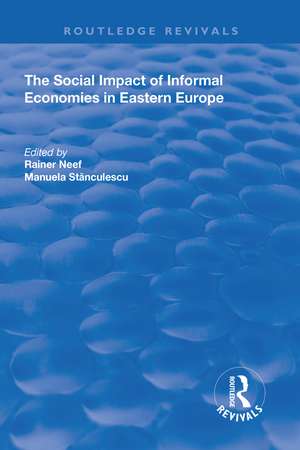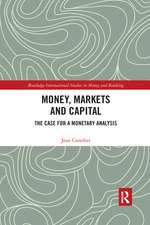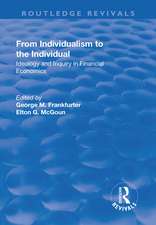The Social Impact of Informal Economies in Eastern Europe: Routledge Revivals
Autor Manuela Stanculescu Editat de Rainer Neefen Limba Engleză Hardback – 21 dec 2017
| Toate formatele și edițiile | Preț | Express |
|---|---|---|
| Paperback (1) | 216.07 lei 43-57 zile | |
| Taylor & Francis – 29 oct 2019 | 216.07 lei 43-57 zile | |
| Hardback (1) | 736.38 lei 43-57 zile | |
| Taylor & Francis – 21 dec 2017 | 736.38 lei 43-57 zile |
Din seria Routledge Revivals
-
 Preț: 258.66 lei
Preț: 258.66 lei - 9%
 Preț: 1038.45 lei
Preț: 1038.45 lei - 9%
 Preț: 934.94 lei
Preț: 934.94 lei -
 Preț: 238.40 lei
Preț: 238.40 lei -
 Preț: 294.72 lei
Preț: 294.72 lei -
 Preț: 258.52 lei
Preț: 258.52 lei - 9%
 Preț: 903.41 lei
Preț: 903.41 lei - 18%
 Preț: 695.85 lei
Preț: 695.85 lei -
 Preț: 296.10 lei
Preț: 296.10 lei -
 Preț: 342.36 lei
Preț: 342.36 lei - 9%
 Preț: 764.28 lei
Preț: 764.28 lei -
 Preț: 317.54 lei
Preț: 317.54 lei - 9%
 Preț: 619.48 lei
Preț: 619.48 lei -
 Preț: 258.66 lei
Preț: 258.66 lei -
 Preț: 245.10 lei
Preț: 245.10 lei - 9%
 Preț: 903.80 lei
Preț: 903.80 lei - 9%
 Preț: 832.07 lei
Preț: 832.07 lei -
 Preț: 153.81 lei
Preț: 153.81 lei -
 Preț: 258.66 lei
Preț: 258.66 lei -
 Preț: 294.97 lei
Preț: 294.97 lei -
 Preț: 200.66 lei
Preț: 200.66 lei -
 Preț: 199.85 lei
Preț: 199.85 lei -
 Preț: 308.89 lei
Preț: 308.89 lei -
 Preț: 295.04 lei
Preț: 295.04 lei -
 Preț: 382.23 lei
Preț: 382.23 lei - 9%
 Preț: 606.35 lei
Preț: 606.35 lei -
 Preț: 343.21 lei
Preț: 343.21 lei -
 Preț: 258.66 lei
Preț: 258.66 lei -
 Preț: 230.80 lei
Preț: 230.80 lei - 9%
 Preț: 640.90 lei
Preț: 640.90 lei -
 Preț: 256.94 lei
Preț: 256.94 lei -
 Preț: 257.67 lei
Preț: 257.67 lei - 9%
 Preț: 801.69 lei
Preț: 801.69 lei -
 Preț: 228.88 lei
Preț: 228.88 lei -
 Preț: 259.47 lei
Preț: 259.47 lei -
 Preț: 368.93 lei
Preț: 368.93 lei - 9%
 Preț: 764.34 lei
Preț: 764.34 lei -
 Preț: 246.37 lei
Preț: 246.37 lei -
 Preț: 326.26 lei
Preț: 326.26 lei -
 Preț: 286.98 lei
Preț: 286.98 lei - 8%
 Preț: 432.15 lei
Preț: 432.15 lei -
 Preț: 258.66 lei
Preț: 258.66 lei -
 Preț: 267.15 lei
Preț: 267.15 lei -
 Preț: 295.10 lei
Preț: 295.10 lei -
 Preț: 259.68 lei
Preț: 259.68 lei - 5%
 Preț: 231.22 lei
Preț: 231.22 lei -
 Preț: 339.90 lei
Preț: 339.90 lei -
 Preț: 380.89 lei
Preț: 380.89 lei -
 Preț: 302.13 lei
Preț: 302.13 lei -
 Preț: 294.72 lei
Preț: 294.72 lei
Preț: 736.38 lei
Preț vechi: 989.73 lei
-26% Nou
Puncte Express: 1105
Preț estimativ în valută:
140.91€ • 147.49$ • 117.28£
140.91€ • 147.49$ • 117.28£
Carte tipărită la comandă
Livrare economică 31 martie-14 aprilie
Preluare comenzi: 021 569.72.76
Specificații
ISBN-13: 9781138719361
ISBN-10: 1138719366
Pagini: 318
Dimensiuni: 152 x 219 x 26 mm
Greutate: 0.45 kg
Ediția:1
Editura: Taylor & Francis
Colecția Routledge
Seria Routledge Revivals
Locul publicării:Oxford, United Kingdom
ISBN-10: 1138719366
Pagini: 318
Dimensiuni: 152 x 219 x 26 mm
Greutate: 0.45 kg
Ediția:1
Editura: Taylor & Francis
Colecția Routledge
Seria Routledge Revivals
Locul publicării:Oxford, United Kingdom
Cuprins
Contents: Foreword, Raymond Pahl; Observations on the concept and forms of the informal economy in Eastern Europe, Rainer Neef; Patterns of participation in the informal economy in East-Central Europe, 1991-1998, Claire Wallace and Christian Haerpfer. Bulgaria: Bulgaria, Nikolay Nenovsky and Darina Koleva; The informal economy in Bulgaria: historical background and present situation, Tanya Chavdarova; Practices and strategies of managing everyday life in a village in socialist Bulgaria, Klaus Roth; Informal farm work in North Western Bulgaria and Eastern Serbia, Milena Benovska-Sabkova. Romania: Romania, Constantin Ciupagea; Romanian households between state, market and informal economies, Manuela Stanculescu; Informal activities in rural areas - family situations in informal farming and day labouring, Esther Golibrzuch; Formal and informal incomes of the Romanian households, Simona Ilie; Economic functions of informal activities in Romania, Constantin Ciupagea. Hungary: Hungary, Endre Sik and János István Tóth; Hidden economy in Hungary, 1992-1999, János István Tóth and Endre Sik; Informal labour market-place on the Moscow square, Endre Sik. Russia: Russia, Alexander Nikulin; Informal economy of rural households: restructuring of family networks and strategies, Olga Fadeeva, Alexander Nikulin and Valerij Vinogradsky. Methods of Research: Of methods and findings on the informal economy, Philippe Adair and Rainer Neef; Appendix: country tables of socio-economic data; Name index.
Notă biografică
Rainer Neef, Universität Göttingen, Göttingen, Germany Manuela Stanculescu, Institutul de Cercetare a Calitatii Vietii, Bucharest, Romania
Recenzii
'The post-communist transition in Eastern Europe is generating a variable and changing range of new forms of informal and underground economy. This book is one of the first attempts to explore the phenomenon and a very useful tool for understanding the present transition in eastern European societies. It is based on extensive empirical evidence and on a balanced range of disciplinary views from sociology to ethnography and economics, with particular attention to Bulgaria, Hungary, Romania and Russia.' Professor Enzo Mingione, University of Milan-Bicocca, Italy
Descriere
This title was first published in 2002. Presenting recent research on the social importance of informal economies, especially in Bulgaria, Hungary, Romania and Russia, the editors give a short introduction for each country, and a common compilation of basic economic and social data follows in the appendix. Household strategies in the ’shadow’, groups of informal winners and loosers, informal employment in town and countryside, outcomes from informal activities, the macro-economic importance of informal economies, and researching methods are all investigated.





